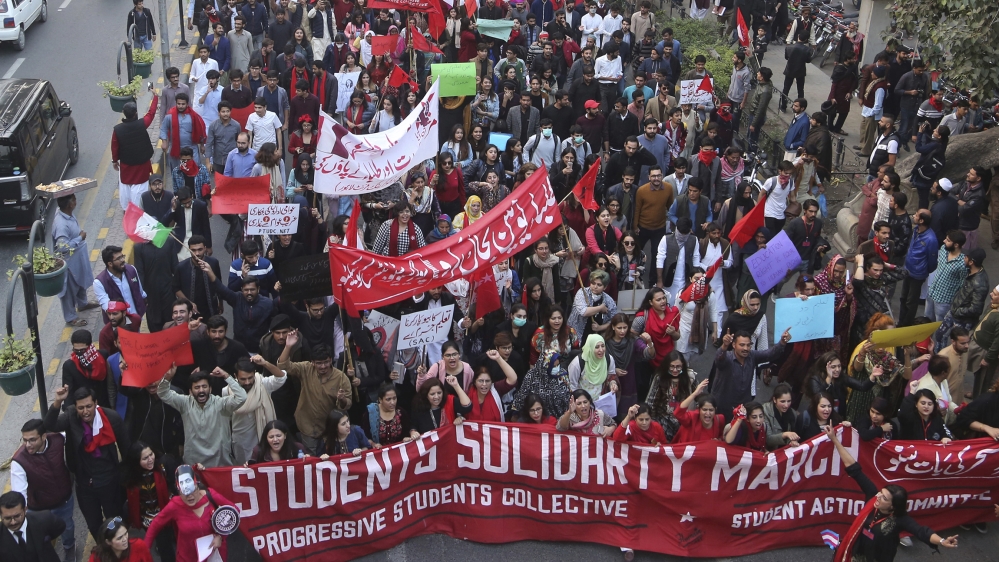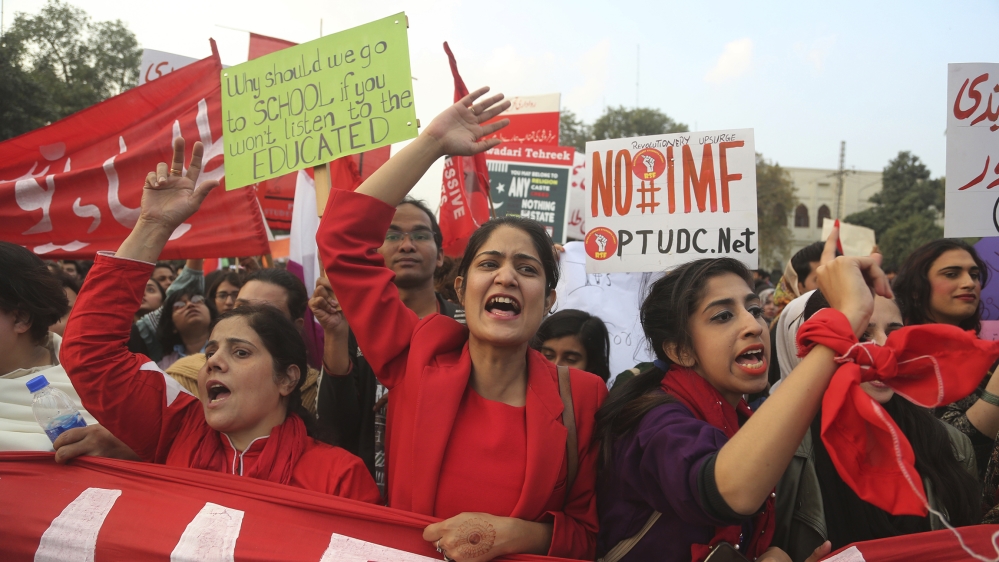‘Love and power’: The revival of people’s politics in Pakistan
Police may have cracked down on student activists but many remain hopeful that their voices are finally being heard.

In cities across Pakistan, students dressed in black with red motifs held placards and shouted slogans demanding the restoration of student unions and an end to sexual harassment on university campuses.
The Students Solidarity March, which took place in at least 50 locations on November 29, came in the wake of a 37 percent cut to the country’s higher education development budget in June.
Keep reading
list of 3 itemsPakistan’s top court grants extension to army chief’s tenure
Pakistan tycoon hands over $248m to settle UK corruption probe
But the story began much earlier, in 1984, when, unnerved by the growing student resistance to his regime, military dictator Zia ul-Haq banned student unions across the country. In more than 30 years since then, this ban has effectively prohibited political activity on campuses and created a culture of silence.
Many of those who conceived of November’s march have been frustrated by the same issues – the ban on student unions, the absence of protocols for dealing with harassment, fee hikes and dissatisfaction with the quality of education on offer – for years. But they banded together in 2016 to form the Progressive Students Collective in Lahore. Today it is just one of many chapters of progressive student organisations across the country.
Waqas*, 23, is a graduate student at Karachi University and one of the organisers of the march. He has been leading study circles, where students gather to discuss political and philosophical texts, in public spaces in Karachi for the past three years. “Enthusiasm [for student politics] is now at its peak,” he explained a few days before the march. “But … I am terrified. I have received so many unknown calls. I’m not a security threat, I’m just a student.”
His fears, it seems, were not unfounded.
Police crackdown
In the wake of the march, police in Lahore filed criminal charges against some of the activists who supported it and arbitrarily detained one of the protesters: Alamgir Wazir, the nephew of Ali Wazir, a parliamentarian and leader of the non-violent Pashtun Tahafuz Movement, which campaigns for an end to human rights violations against Pakistan’s Pashtuns.

Among those named in the police report are Ammar Ali Jan, a former assistant professor at Punjab University who was asked to resign from his post in 2018 on the grounds that he was encouraging his students to become too vocal, and Iqbal Lala, the father of Mashal Khan, a 25-year-old student who was lynched by fellow students at Abdul Wali Khan University in Mardan in April 2017 after being falsely accused of blasphemy.
“That Mashal Khan’s father was targeted – that aches the most. A man who lost his son, and showed up for his [son’s] cause,” said Husnain*, 27, a political science graduate from Punjab University, and one of the organisers of the march in Lahore.
He and other organisers are now torn between the hope they felt after the march and the frustration that arose after the police crackdown.
Zahabia*, 23, one of the organisers of the march in Karachi, has mixed feelings, even while acknowledging that the march was ultimately successful: the provincial government of Sindh, of which Karachi is a part, has announced that it will take the lead in restoring student unions. “Our demands are so legitimate and so practical. They are just harassing us,” she said of the police crackdown. “The state finds different ways to discredit anything that tends to question its hegemony, incompetence and control.”
Dissatisfied with teaching standards
Zahabia, Husnain, Waqas and others are part of a generation that forms the biggest youth demographic in Pakistan’s history – roughly 120 million Pakistanis are under the age of 30, making up 64 percent of the country’s population, according to a 2017 report by the United Nations Development Programme Pakistan.
The prognosis for this generation is poor. It has to contend with one of the highest youth unemployment rates in the region. Only 30 percent of students reach 10th grade, after which many either join the casual labour force or are unemployed, according to data from Pakistan Education Statistics. But among the small percentage who are able to attend university, dissatisfaction with the standard of teaching, particularly in public universities, is increasingly widespread.
“Frankly, it’s not worth investing in education. They are just churning out machines,” said Husnain.

Twenty-five-year-old Haider*, a journalism graduate from Beaconhouse National University in Lahore, feels the same. He acknowledges that in terms of infrastructure and resources, his campus was better than many others across the country, but believes there is little room for critical thinking and research. “If you’re going to teach gender studies and your faculty member refuses to recognise any gender other than male and female, then what is the point?” he asked.
Sexual harassment
But, he added, poor teaching is not even the primary concern for many students; harassment is. An editorial in the Dawn, one of the country’s largest newspapers, earlier this year drew attention to the issue, arguing that universities have to fight much harder to tackle sexual harassment, especially when their own professors and staff are the perpetrators.
Few understand this better than Sadia, 19, a first-year law student at Balochistan University. In Balochistan, the disparity between literacy rates for males and females is stark. Sadia’s university, one of the oldest and most prestigious in the province, is under investigation by the Federal Investigation Agency after male and female students reported being harassed by members of the administration, who used secretly installed cameras to record CCTV footage to blackmail them. The university’s vice-chancellor stepped down on October 20.
“It’s difficult enough for us to even attend university in a tribal society like ours,” explained Sadia, who participated in one of the marches. “Many girls left their studies after what happened.”
Sadia is a member of the Baloch Student Organisation, which was founded in the 1960s and is the largest Baloch student body in the country. It has been mobilising students to join the chapter of the Students Solidarity March that took place in Balochistan.
But, she said, her family are not comfortable with her activism.
“My family don’t want their daughter to go missing,” she explained, referring to the enforced disappearances that have taken place in her province.
“In our society, we are oppressed within the home and outside. We have to defeat the home also, and then [fight] on a bigger level,” she said.
A feminist movement
At the march in Karachi, a cream poster with bold black letters stood out in a sea of placards. “A Woman’s Place is in the Resistance,” it proclaimed.

Zahabia sees the feminist movement as essential to the success of the student movement. “As it is our society is so patriarchal, and women are kept away from politics,” she said.
She was one of the leaders of the march in Karachi and explained: “People were happy to see me, I was moderating as well and then leading the march. I was involved in organising it, too. So there is hope, and I’m pretty sure this is how people inspire each other.”
In that sense, the Students Solidarity March was a placeholder march; an opportunity for students of all genders, ethnicities and religions to come together to demand simply that their voices be heard. It was a historic moment for many reasons, but most critically because it was an inclusive revolution.
“The students are really speaking to the people. That’s who they believe have the power to change the system. They want a revival of people’s politics,” explained Tooba Syed, 29, a grassroots organiser and visiting faculty member at Quaid-i-Azam University in Islamabad. “They are rising because they have realised that they have nothing. The present is crumbling and there is no future.”
She points out, too, that many young people were hopeful when Imran Khan’s government came to power, buying into his vision of “naya”, or new, Pakistan. Instead, a year and a half later, the economy is in the worst state it has been in for the past 10 years and many people have been left feeling disillusioned.
Perhaps that is why the student marches were able to capture the imaginations of so many young people.
“Random people came up to me and said it was the best day of their life,” said Haider. “There were people everywhere, and they were looking after each other … they were angry, but together in their anger. There was a lot of love. A lot of power.”
*Only the first names of interviewees have been used to protect their identities.